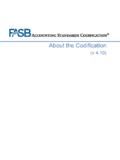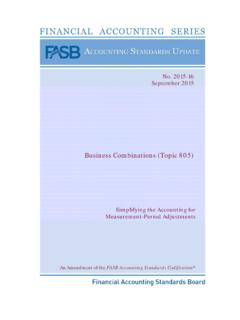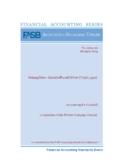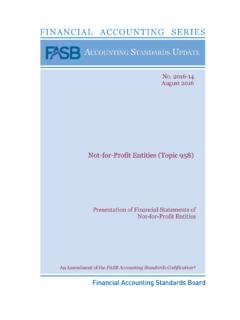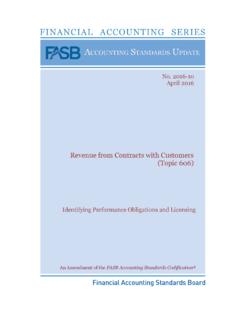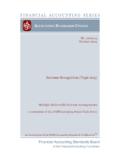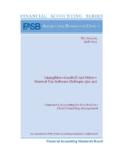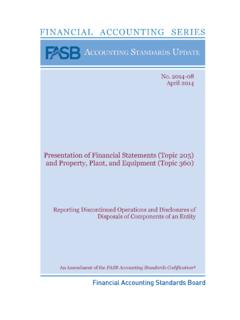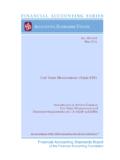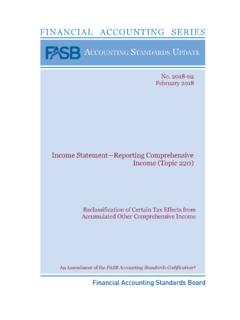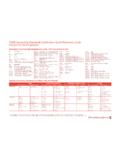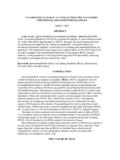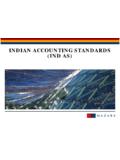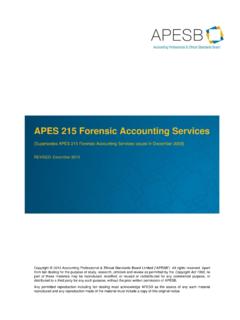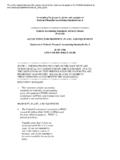Transcription of Income Taxes (Topic 740) - FASB Accounting Standards ...
1 Income Taxes (Topic 740) An Amendment of the FASB Accounting Standards CodificationTM No. 2009-06 September 2009 Implementation Guidance on Accounting for Uncertainty in Income Taxes and Disclosure Amendments for Nonpublic Entities The FASB Accounting Standards CodificationTM is the single source of authoritative nongovernmental generally accepted Accounting principles. An Accounting Standards Update is not authoritative; it only provides background information about an issue, updates the Accounting Standards Codification, and provides the basis for conclusions for the Board s decision to update the Accounting Standards Codification. For additional copies of this Accounting Standards Update and information on applicable prices and discount rates contact: Order Department Financial Accounting Standards Board 401 Merritt 7 PO Box 5116 Norwalk, CT 06856-5116 Please ask for our Product Code No.
2 ASU2009-06. FINANCIAL Accounting SERIES (ISSN 0885-9051) is published quarterly by the Financial Accounting Foundation. Periodicals postage paid at Norwalk, CT and at additional mailing offices. The full subscription rate is $230 per year. POSTMASTER: Send address changes to Financial Accounting Standards Board, 401 Merritt 7, PO Box 5116, Norwalk, CT 06856-5116. | No. 318 Copyright 2009 by Financial Accounting Foundation. All rights reserved. Content copyrighted by Financial Accounting Foundation may not be reproduced, stored in a retrieval system, or transmitted, in any form or by any means, electronic, mechanical, photocopying, recording, or otherwise, without the prior written permission of the Financial Accounting Foundation. Financial Accounting Foundation claims no copyright in any portion hereof that constitutes a work of the United States Government.
3 An Amendment of the FASB Accounting Standards CodificationTM No. 2009-06 September 2009 Income Taxes (Topic 740) Implementation Guidance on Accounting for Uncertainty in Income Taxes and Disclosure Amendments for Nonpublic Entities Accounting Standards Update Financial Accounting Standards Boardof the Financial Accounting Foundation401 MERRITT 7, PO BOX 5116, NORWALK, CONNECTICUT 06856-5116 Accounting Standards Update 2009-06 Income Taxes (Topic 740) Implementation Guidance on Accounting for Uncertainty in Income Taxes and Disclosure Amendments for Nonpublic Entities September 2009 CONTENTS Page Numbers 3 Amendments to the FASB Accounting Standards 10 Background Information and Basis for Conclusions ..11 14 Amendments to the XBRL 1 Summary Why Is the FASB Issuing This Accounting Standards Update (Update)? The Board is issuing this Update to address the need for additional implementation guidance on Accounting for uncertainty in Income Taxes .
4 The guidance answers the following questions: 1. Is the Income tax paid by the entity attributable to the entity or its owners? 2. What constitutes a tax position for a pass-through entity or a tax-exempt not-for-profit entity? 3. How should Accounting for uncertainty in Income Taxes be applied when a group of related entities comprise both taxable and nontaxable entities? In addition, after consulting with constituents including the FASB s Private Company Financial Reporting Committee (PCFRC) and others, the Board decided to eliminate the disclosures required by paragraph 740-10-50-15(a) through (b) for nonpublic entities. Who Is Affected by the Amendments in This Update? The implementation guidance will apply to financial statements of nongovernmental entities that are presented in conformity with generally accepted Accounting principles (GAAP).
5 The disclosure amendments will apply only to nonpublic entities as defined in Section 740-10-20. What Are the Key Provisions? The amendments to the FASB Accounting Standards Codification in this Update provide implementation guidance, through examples, to answer the three questions mentioned above about how to apply the Standards for uncertainty in Income Taxes . 1. If Income Taxes paid by the entity are attributable to the entity, the transaction should be accounted for consistent with the guidance for uncertainty in Income Taxes in Topic 740. If Income Taxes paid by the entity are attributable to the owners, the transaction should be recorded as a transaction with owners. The determination of attribution should be made for each jurisdiction where the entity is subject to Income Taxes 2 and is determined on the basis of laws and regulations of the jurisdiction.
6 2. The amendments clarify that management s determination of the taxable status of the entity, including its status as a pass-through entity or tax-exempt not-for-profit entity, is a tax position subject to the Standards required for Accounting for uncertainty in Income Taxes . 3. A reporting entity must consider the tax positions of all entities within a related group of entities regardless of the tax status of the reporting entity. In addition, the amendments eliminate the disclosures required by paragraph 740-10-50-15(a) through (b) for nonpublic entities. Paragraph 740-10-50-15(a) requires a tabular reconciliation of the total amount of unrecognized tax benefits at the beginning and end of the periods presented. Paragraph 740-10-50-15(b) requires the disclosure of the total amount of unrecognized tax benefits that, if recognized, would affect the effective tax rate.
7 How Are the Key Provisions Different from Current Generally Accepted Accounting Principles (GAAP) and Why Are They an Improvement? The amendments eliminate the disclosures required by paragraph 740-10-50-15(a) through (b) for nonpublic entities. Users of private company financial statements have indicated that the disclosures required by that paragraph do not provide decision-useful information. Therefore, the amendments reduce the cost of preparing private company financial statements without eliminating the decision-useful information needed by the users of those statements. The amendments do not alter the disclosure requirements for public companies. Users of public company financial statements have indicated that the information in paragraph 740-10-50-15(a) through (b) is useful. The additional implementation guidance improves current Accounting by helping to achieve consistent application of Accounting for uncertainty in Income Taxes .
8 The guidance is not intended to change practice. It has been issued to provide additional implementation guidance on Accounting for uncertainty in Income Taxes and does not change other requirements of Topic 740. Although the guidance is not intended to change practice, there may be instances in which practice does change. In those situations, disclosures shall be made in accordance with Section 250-10-50. 3 When Will the Amendments Be Effective? For entities that are currently applying the Standards for Accounting for uncertainty in Income Taxes , the guidance and disclosure amendments are effective for financial statements issued for interim and annual periods ending after September 15, 2009. For those entities that have deferred the application of Accounting for uncertainty in Income Taxes in accordance with paragraph 740-10-65-1(e), the guidance and disclosure amendments are effective upon adoption of those Standards .
9 The amendments in this Update do not affect the effective date guidance for certain nonpublic entities in paragraph 740-10-65-1. How Do the Provisions Compare with International Financial Reporting Standards (IFRS)? The amendments in this Update provide guidance on Accounting for uncertainty in Income Taxes . This Update also amends disclosure requirements for nonpublic entities for unrecognized tax benefits. As of the issuance date of this Update, IFRS do not specifically address Accounting for uncertainties in Income Taxes ; instead, the general guidance for contingencies is applied to uncertain tax positions. The current IFRS approach to contingencies is similar to Accounting for loss contingencies described in paragraph 450-20-25-2. 5 Amendments to the FASB Accounting Standards CodificationTM Introduction 1. The following are amendments to the Accounting Standards Codification as a result of this Update.
10 In some cases, not only are the amended paragraphs shown but the preceding and following paragraphs also are shown to put the change in context. Terms from the Master Glossary are in bold type. Added text is underlined, and deleted text is struck out. Amendment to Master Glossary 2. Amend the Master Glossary term Tax Position, with a link to transition paragraph 740-10-65-2, as follows: Tax Position A position in a previously filed tax return or a position expected to be taken in a future tax return that is reflected in measuring current or deferred Income tax assets and liabilities for interim or annual periods. A tax position can result in a permanent reduction of Income Taxes payable, a deferral of Income Taxes otherwise currently payable to future years, or a change in the expected realizability of deferred tax assets. The term tax position also encompasses, but is not limited to: a.
